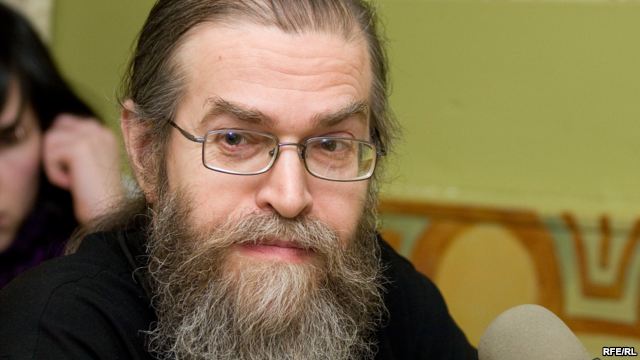.gif) [http://www.1tvnet.ru/images/news_pic_Krasotin%2520sam%2520skoro%2520nauchitsya/735776%20(1).gif]
[http://www.1tvnet.ru/images/news_pic_Krasotin%2520sam%2520skoro%2520nauchitsya/735776%20(1).gif]
Five members of the feminist punk rock group Pussy Riot have been arrested for a “punk prayer” at the Church of the Savior in Moscow. Two are being held until late April with threats of sentences up to seven years. The civilian authorities and Putin in particular have declared that their actions are “disgusting.” But some in the church are arguing that this is a church matter and all should be welcome in the church. For a Russian historian the arrest of these women on church property looks like a return to the Byzantine era when church and state were not separated. The civilian authorities make noises about the offenses to the church, but their real concern – and fear – is political protest. Will freedom of speech now be completely eroded?

Father Iakov Krotov from the linked article at http://svobodanews.ru
2 replies on “Pussy Riot Arrest and Byzantine Church-State Relations Today”
The fact that few people know (and that Yakov Krotov brings to light) is that the Church of Christ the Saviour is not church property, but of the Moscow mayor’s office.
“For a Russian historian the arrest of these women on church property looks like a return to the Byzantine era when church and state were not separated…”
I am afraid the situation is more complicated. I have a feeling that the affair was orchestrated by the FSB from the beginning. The recent protests demonstrated a united negative attitude towards the Putin’s regime spread across the Russian oppositional spectrum (liberal, communist and Russian nationalist). “The Pussy Riot affair” is too convenient to be used as a tool to prevent this tendency for the oppositional unity.
There are no angels within the Church top hierarchy (pun intended) but still it is an institution out of the direct state control. That is why it is potentially dangerous for the regime. Playing on the side of the conservative wing of the Church the authorities make the Church look as a nest of obscurantism, firstly, effectively splitting the society over a minor issue and secondly, preventively compromising a dangerous institution in the eyes of the liberals and democratic nationalists.
So, I believe for a Russian historian the affair looks more like an episode of Okhrana’s activities.